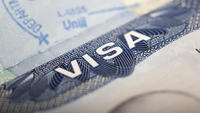-
Spanish “kebab laws” worry, upset Muslim immigrants
Withy persistent unemployment and worries about radicalization, more Spanish cities are placing limits on businesses typically owned and operated by immigrants from North Africa. In the city of Terragona, for examples, these regulations – informally called “kebab laws” — disallow commercial licenses to any kebab shops, dollar stores, or Internet cafes within 500 yards of existing ones. Additionally, these businesses would have to comply with stricter hygiene standards and business hours. Muslim leaders in Spain and civil rights advocates say these laws are a thinly veiled effort to discourage Muslim immigration.
-
-
Tech companies push for more visas for highly skilled foreign workers
Tech companies seeking more visas for highly skilled foreign workers are pushing their agenda as the United States grant visas to a number of immigrants in a lottery which began this week. Supporters of the campaign say 233,000 people are vying for 85,000 H-1B temporary visas. Some critics want to cut back on the H-1B visas, blaming the program for displacing American workers, butcalls to scale back on H-1B visas will have to overcome a campaign backed by powerful groups. In 1999, Congress raised the cap to 115,000 to help the booming technology sector. That limit soon rose to 195,000 before falling back to its current level in 2004.
-
-
Countries brace for forced migration due to climate change
Scientists say that one of the more disturbing aspects of climate change-related disruptions is looming climate-induced migration crisis. Extreme weather disasters, sea level rise, and environmental degradation are factors which could trigger a mass migration, disrupting populations and destabilizing governments. A recent study sponsored by the governments of Switzerland and Norway found that an estimated 144 million people were at least temporarily displaced between 2008 and 2012.
-
-
Agriculture groups say bill would disrupt farming operations, decrease food production
The Legal Workforce Act(LWA — H.R. 1147), introduced by U.S. Representative Lamar Smith (R-Texas) and approved this week by the House Judiciary Committee, could disrupt farming operations if it passes Congress. LWA requires employers in the United States, within three years, to use E-Verifyto verify whether employees are legally allowed to work in the country. Ag industry groups say that passing LWA without some sort of immigration reform for agricultural workers could lead to a $30 billion to $60 billion decrease in food production. The ag industry also notes that each of the two million hired farm employees supports two to three fulltime American jobs in the food processing, transportation, farm equipment, marketing, retail, and other sectors.
-
-
Spouses of H-1B visa holders may apply for their own work permits
As the White House works to lift an injunction placed by U.S. District Judge Andrew Hanen to prevent the issuing of temporary work permits and deferred deportation to some undocumented parents of American citizens and permanent residents, the Obama administration said on Tuesday that it will move forward with another immigration reform measure it announced last November. Beginning 26 May, spouses of foreign tech workers who hold H-1B visas will be able to apply for work permits of their own.Silicon Valley leaders applauded the measure.
-
-
House delays vote on “the toughest border security bill ever”
The House was supposed to vote on Wednsday on what Republicans have called “the toughest border security bill ever,” but the bill encountered harsh criticism from different sides of the GOP caucus. Some complained the measure does not address the pressing issue of immigration reform, while others complained it was the first step on slippery slope toward such reform. The border security bill, Secure Our Borders First Act (H.R. 399), sponsored by House Homeland Security Chairman Michael McCaul (R-Texas), would impose harsh penalties for federal agencies that fail to meet certain requirements. One mandate aims for DHS to achieve “operational control,” or prevent illegal entry across the southern border, within five years. If DHS fails to achieve that objective, political appointees at the agency would be prohibited from traveling in government vehicles, receive reimbursement for nonessential travel, or receive pay increases or bonuses.
-
-
Study: Disparities seen in immigrant application results
Immigrants to the United States with job offers often apply for work authorization. But immigrants from Latin America are less likely to have those requests granted than are immigrants from other regions. A new study shows that over a recent period of more than three years, the U.S. federal government approved about 91 percent of labor certification applications from Asian immigrants and 90 percent from Canadian immigrants, but just 67 percent of applications from Latin American immigrants. The study controls for variations in the offered salaries and job titles; characteristics of the firms making the offers; and the visa histories of the immigrants in question.
-
-
U.S. seen losing its share of world’s highly skilled migrants
The United States has always been known as a nation of immigrants and a top destination for scientists and other highly skilled professionals. That ability to attract the world’s most educated and innovative people to its shores has often been credited with powering the U.S. economy. Strikingly, a new study of worldwide migration patterns suggests the United States is losing its reputation as a mecca for professionals as its global share of the most highly educated migrants declines. The result raises the question of whether the country can remain competitive in attracting top talent in an increasingly globalized economy.
-
-
Undocumented construction workers in NYC will benefit from Obama’s executive action

Undocumented workers in the U.S. construction industry have much to gain from President Barack Obama’s Deferred Action for Parental Accountability (DAPA) initiative, which allows some immigrants to apply for work permits while deferring deportation attempts. New York City’s booming construction market has attracted thousands of undocumented workers who are willing to work for low wages, but it has also encouraged many property developers to ignore safety hazards around construction sites.
-
-
Undocumented immigrants can now practice law in Florida
On 20 November, Jose Godinez-Samperio took the oath of admission to the Florida Bar, but unlike many lawyers before him, Godinez-Samperio was not a U.S. citizen.The state legislature amended an existing family law bill to allow would-be lawyers like Godinez-Samperio to practice law in Florida.
-
-
Tech industry disappointed with lack of details on visas for skilled foreigners

Leaders of the U.S. tech industry hoped President Barack Obama’s recent immigration speech would unveil specifics on how his executive action on immigration would affect the number of highly skilled foreigners who would be granted American work visas. Instead, Obama just mentioned that he would “make it easier and faster for high-skilled immigrants, graduates and entrepreneurs to stay and contribute to our economy, as so many business leaders have proposed.”Since Obama did not announce specific plans for the H-1B visa program, tech industry leaders will now push for more congressional support – even though the House did not bring to a vote a bi-partisan Senate bill which would have increased visas for skilled workers to at least 115,000.
-
-
As U.K. elections approach, immigration debate simmers

As the 2015 British Parliamentary elections approach, increasing attention is focused on current immigration issues and attitudes in the kingdom, especially by right-leaning politicians.Prime Minister David Cameron vowed to reduce overall migration to the country to less than 100,000 people a year by 2015, including migrants from within the European Union, but critics, including business and academic leaders, say such a goal is unrealistic and undesirable.
-
-
Immigration judge says changes needed in “fast-tracking” immigration cases
While the Obama administration cites evidence that the surge of migrant children from Central America is declining, a leading immigration judge is arguing that the Department of Justice (DOJ) process of “fast-tracking” the cases — often without any legal representation for the defendant — is padding the numbers and also creating other problems of its own.
-
-
DHS IG: manual processing faster than Electronic Immigration System (ELIS)
A new reportby DHS Office of Inspector Generalconcludes that the department’s $1.7 billion Electronic Immigration System(ELIS), used to process forms for benefits, VISAs, and refugee requests, is inefficient as it takes twice as long as processing the applications manually.Currently, workers spend roughly 125 clicks per application, a more time-consuming process than processing the forms manually.
-
-
High-tech industry-backed immigration reform advocacy group mulls strategy
FWD.us, an immigration advocacy group launched by Facebookfounder Mark Zuckerberg, has spent millions of dollars on advertising and events to persuade members of Congress to revamp the country’s immigration policy, but despite having the capital, connections, and star power, the tech industry-based group is now forced to reorganize its strategies in the midst of a polarizing immigration debate.
-
- All
- Regional
- Water
- Biometrics
- Borders/Immig
- Business
- Cybersecurity
- Detection
- Disasters
- Government
- Infrastructure
- International
- Public health
- Public Safety
- Communication interoperabillity
- Emergency services
- Emergency medical services
- Fire
- First response
- IEDs
- Law Enforcement
- Law Enforcement Technology
- Military technology
- Nonlethal weapons
- Nuclear weapons
- Personal protection equipment
- Police
- Notification /alert systems
- Situational awareness
- Weapons systems
- Sci-Tech
- Sector Reports
- Surveillance
- Transportation
Advertising & Marketing: advertise@newswirepubs.com
Editorial: editor@newswirepubs.com
General: info@newswirepubs.com
2010-2011 © News Wire Publications, LLC News Wire Publications, LLC
220 Old Country Road | Suite 200 | Mineola | New York | 11501
Permissions and Policies
Editorial: editor@newswirepubs.com
General: info@newswirepubs.com
2010-2011 © News Wire Publications, LLC News Wire Publications, LLC
220 Old Country Road | Suite 200 | Mineola | New York | 11501
Permissions and Policies
